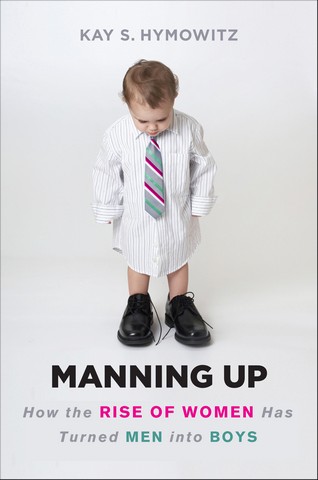Review: Manning Up: How the Rise of Women Has Turned Men into Boys by Kay S. Hymowitz
Bookshelf
By Nathaniel Clarkson (James Madison)
 Previous generations entering the workforce have benefitted from a proverbial script outlining when and how major life events will take place. You’re born, you grow up, learn to hunt and work the land, get married, have children, and grow old. If previous generations had a script to follow, the current generation entering the workforce is navigating life with something closer to a choose-your-own-adventure novel.
Previous generations entering the workforce have benefitted from a proverbial script outlining when and how major life events will take place. You’re born, you grow up, learn to hunt and work the land, get married, have children, and grow old. If previous generations had a script to follow, the current generation entering the workforce is navigating life with something closer to a choose-your-own-adventure novel.
The knowledge economy – more sophisticated, complicated, and dynamic than ever before – means a longer road to adulthood as young people dabble and explore a seemingly endless variety of career choices. A more complex economy means more time to figure out where exactly you fit in, says Kay Hymowitz, author of Manning Up: How the Rise of Women Has Turned Men Into Boys.
“The preadult is stunned with possibility, a predicament unknown to most of the human race up until recently,” Hymowitz writes. “Humans are social creatures naturally inclined to adapt to cultural rules and maps. Yet preadults have no instruction manuals.” Choosing your own career means taking longer to grow up, as defined by major life milestones like getting married, buying a house, and having kids. Renowned management thinker Peter Drucker detected this phenomenon back in 2005 when he observed how most people don’t know where they fit into a complex economy until their mid-20s.
The knowledge economy no longer relies on physical strength, Hymowitz notes in her book. As factory jobs became automated or moved to Asia, fields like PR, marketing, and design became increasingly important in a world where helping consumers differentiate between infinite choices is paramount. To say these jobs multiplied at the expense of manufacturing would be oversimplifying. But most of this job growth came in fields that require the so-called soft skills like emotional intelligence.
For reasons researchers don’t fully understand yet, women are more attracted to jobs that require the strong organizational skills that are so highly valued in the knowledge economy. Thanks to a host of factors -- including changing attitudes towards women in the workplace, greater access to education, and an economy shifting towards fields requiring emotional intelligence – women have made major gains in terms of workplace options and general work-life opportunities.
Industry analysts have noticed a similar phenomenon in the startup community. Women entrepreneurs, they say, seem to be better at sensing what consumers really want – a crucial skill in the age of mass customization and endless product variety.
While expanded opportunities for women represent a welcome sign of progress, some observers have expressed concern that their male counterparts are being left behind. Nowhere is this growing gap more evident than on today’s college campus.
In Manning Up, Hymowitz devotes detailed attention to the dramatic shift surrounding higher education in the last four decades. From 1975 to 2006, she notes, the proportion of women with at least a college degree increased from 19 to 34 percent. During the same period the corresponding percentage for men increased from 27 to 29 percent. Many experts are predicting that women will account for 60 percent of college graduates in the coming years.
The news gets more concerning as we observe how male students tend to be less engaged on campus and less likely to join a campus organization. According to studies cited in Manning Up, women are more likely to participate in class discussion and tend to communicate more regularly with faculty, often resulting in more promising employment outlook after school. It has been well documented in recent years that women tend to graduate with higher GPAs than their male counterparts. As management philosophy shifts women are also poised to take on more leadership roles in corporate governance.
Men are falling behind, Hymowitz says, because they’re coming of age in an era without conventions and structure to guide the way. Where templated life scripts once ruled, nonlinear career paths are the new normal.
The good news is that fraternity and sorority members are primed to succeed where their non-fraternity counterparts are more likely to falter. According to recent findings by Gallup, fraternity membership is linked to higher well-being and better work engagement for college graduates.
“The 16% of college graduates who were members of Greek organizations are more likely to report being emotionally supported and having experiential and deep learning activities while in college, all of which likely have contributed to their higher work engagement and well-being,” the report said. The findings further concluded that fraternity and sorority members are more likely to be engaged with their organizations and more enthusiastic about their work.
While dense on research and analysis, Manning Up is light on prescriptions for correcting the achievement gap between young men and women. With the depth of coverage Hymowitz devotes to higher education, however, she reveals her thoughts on one of the root causes of young men falling behind. With a better handle on instilling useful life skills and emotional intelligence, fraternities are in good position to deliver the antidote a floundering generation so desperately needs.